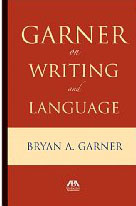Keep it Simple Stupid…Garner on Language and Writing

Bryan A. Garner is Editor-in-Chief of the current edition of Black’s Law Dictionary and the author of many books and articles on legal writing.
The author has written and lectured extensively on legal writing and has compiled many of his papers, articles and speeches on this topic within this book. Because of the nature of the compilation and its length, the book is mildly repetitive although such a minor criticism does not detract from its value.
This is a book written for lawyers who are engaged in transactional legal work and those engaged in litigation. It is a book that judges should, for the sake of lawyers and their clients, be urged to read.
In making his point for simplicity, clarity and an entertaining style, he speaks to every lawyer who needs to place their thoughts or arguments in writing. In doing so, he draws not only upon American sources but also extensively upon English legal and literary figures.
I wish that, as a law student and as a young barrister, I had had a better understanding of the need to write simply in order to be persuasive. One could and did fall easily into the habit of speaking and writing with stock phrases. One good point made is that if you want to achieve good writing merely reading judgments may not be the best place to start. Long ago I recall a book by Lord Denning instructing young counsel to read widely in order to write well and eventually to speak well. Garner quotes Lord Denning on the question of a need to cultivate a winning legal style. He quotes Lord Denning to have said this:
“You must cultivate a style that commands attention. No matter how sound your reasoning, if it is presented in a dull and turgid setting, your hearers – or your readers – will turn aside. They will not stop to listen. They will flick over the pages. But if it is presented in a lively and attractive setting, they will sit up and take notice. They will listen as if spellbound. They will read you with engrossment.”
From the US Supreme Court, he quotes the Honourable Antonin Scalia:
“Too many lawyers believe that it is essential to legal English that one write as pompously as possible, using words and phrases that have long since disappeared from normal English discourse.”
This is a book which ought be kept on one’s bookshelf for occasional reference and as a reminder to write simply and persuasively. To judges who are beset with massive time restraints, more time spent simplifying their judgments may assist to have those judgments read more widely and understood. How many times as a student and a practising lawyer has one spent being confused and bored by judgments? Garner’s view is that great judgments are remembered and re-read because they are well written. It is in the public interest that judges be given more time to write their judgments.
In Justice Dyson Heydon’s famous speech to the Friends of Quadrant prior to his appointment to the High Court, he said that judgments rather than revealing judicial or associate generated erudition, show nothing more than an attempt to quote every possible case on or near the subject to the relevant issue. Such case-quoting-clutter obscures the reasoning in judgments and renders them opaque and impenetrable. Perhaps, judges too should be taught how to produce better written work.
Garner also recommends that law schools should have a specific subject dealing with plain legal writing. He states that such is assumed amongst students but is commonly absent when most graduates appear in practice. Some guidance has been given locally on the need for a clear simple approach to writing in Michele Asprey’s Plain Language for Lawyers now in its fourth edition. However where that work reads like a text book Garner’s book reads more like the kind of accessible material found in books by one-time political speech writer Don Watson . Watson’s Bendable Learnings , which deals a death blow to management speak and his Death Sentence- the decay of public language have become Australian best sellers. Until Watson or someone like him turns their sharp attention on legal speak in Australia this book by Garner will serve the intervening period well.
Garner on Language and Writing
(Selected Essays and Speeches of Bryan A. Garner)
American Bar Association, Chicago 2009
ISBN – 13:978-1-60442-445-4; 839 pp Hard Cover

